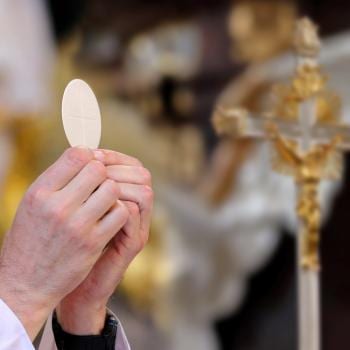This week, Pope Francis raised some eyebrows when, in an interview, he discussed the possibility of the Church endorsing “civil unions” for homosexual partners. He asserted that marriage was indeed for men and women only, but seemed to propose a more open minded and pastoral approach to the question of homosexual relationships than some would expect from the Church. His comments, as they often do, have caused some degree of consternation among many faithful Catholics who are fearful that Pope Francis is somehow seeking to dilute traditional teaching. Simultaneously, many progressives in the Church rejoiced to hear the Pope articulate an agenda that was much more in line with their own vision.
Pronouncing v. Thinking Out Loud
This isn’t so much a post about civil unions as much as it is about an insight that occurred to me as I was contemplating the interview I referenced above. Specifically, it seems to me that we’re all used to popes who, when they speak, tend to pronounce “what is.” I don’t use the word “pronounce” in an authoritarian way, as in an “I have spoken, thus shall it be!” sense, so much as in an authoritative sense, as in the “these are the facts that represent the boundaries of the conversation” sense. Both JPII and BXVI were more what I would consider authoritative pronouncers in their public comments. There were very much theology professors and writers. Their style was much more careful when it came to their public pronouncements and when they did speak to an issue, it was usually to draw the boundaries that would constitute what were reasonable points of discussion and which were not. Their public commentary tended to take the form of authoritative pronouncements that didn’t shut down discussion, but clearly defined the boundaries between what was on the table and what was not.
That said, I think because most of us are used to Popes speaking this way, we are all prone to take Pope Francis more seriously than he may even take himself. I don’t mean to suggest that we shouldn’t take what the Pope says seriously, but it occurs to me that rather than pronouncing in even
the more authoritative manner of his predecessors, Pope Francis style of speaking is much more like, “thinking out loud about the Church.”
What is, “A Pastoral Approach”?
As a counselor, I will often “think out loud” in session. I reflect what I hear the client say and whether I agree with it or not, I let the client know it’s safe to talk about these things in my presence. It may be my intention to move the conversation toward solutions that are far from what the client is saying, but in order to do that, I need to let the person know that I have heard them, that I am genuinely listening, and that I sincerely understand and care about the concerns that their comments reflect. Pope Francis isn’t a therapist, but he used to be a psychology professor, and he is very much a pastor, and good pastors will often use a similar technique of reflecting and “thinking out loud” as a way of both beginning a thoughtful conversation and trying to bring everyone along in the search for solutions.
The more I watch Pope Francis, the more I have come to believe that often when he speaks, and especially when he speaks in interviews, he is not pronouncing as Pope, but “thinking out loud” as the Church’s “primary pastor.” Before beginning a serious discussion about particular solutions (e.g., the Extraordinary Synod) he wants to make sure you know you’ve been heard, not just as a technique, but sincerely, from the heart. Further, he wants to be sure you to know that he will take your concerns seriously as he moves forward to articulate the Church’s vision.
I think the faithful will be much less likely to panic when Pope Francis speaks if they can adopt the perspective I am suggesting. Pope Francis is not–at least to this point–a “pronouncing pope.” He is a “thinking out loud about the Church” Pope who is inviting the world to think out loud about it too so that perhaps, together, we can find a way to translate and live up to eternal truths in a manner that is consistent with the past but makes sense both in the present and for the future.
Sticking My Head in the Sand?
No doubt some readers will accuse me of sticking my head in the sand, and that may be, but I don’t think so. It would be different if the Holy Father was not consistently affirming Church teaching in his comments, but he always does, and never in that off-hand way that progressives tend to do so that they can maintain plausible deniability that they are not, in fact, seeking to undermine the very teachings they are tipping their hats to. Pope Francis,it seems to me, is much more confident both asserting that Church teaching is what it is and respecting that. Even so, it seems important to him to show that respecting the historic and traditional truths of the Church does not mean that we can’t think out loud about how to apply those truths in this post-Christian, post-modern era. Instead, Pope Francis’ approach of “thinking out loud about Church” may lead to a greater devotion to tradition because we will have discovered ways to make the old things new again.















